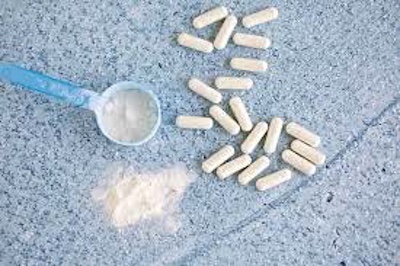
by Catherine Kruppa, MS, RD, CSSD, LD.
Did you know that collagen is the most plentiful protein in your body? Collagen is a protein that provides structure to much of your body, including your bones, skin, tendons, and ligaments. As you age, your body produces less and lower quality collagen. One of the visible signs of this is in your skin, which becomes less firm and supple. Cartilage also weakens with age.
You may be able to help your body produce this important protein by making sure you get plenty of the following nutrients:
- Vitamin C. Found in citrus fruits, bell peppers, and strawberries.
- Proline. Found in egg whites, wheat germ, dairy products, cabbage, asparagus, and mushrooms.
- Glycine. Found in gelatin, but glycine is also found in various protein-containing foods.
- Copper. Found in sesame seeds, cocoa powder, cashews, and lentils
Your body also needs high quality protein that contains the amino acids needed to make new proteins. Meat, poultry, seafood, dairy, legumes, and tofu are all excellent sources of amino acids.
It is also important to avoid behaviors that destroy collagen:
- Eating too much sugar and refined carbohydrates. Sugar interferes with collagen’s ability to repair itself.
- Getting too much sunshine. Ultraviolet radiation can reduce collagen production. Avoid excessive sun exposure.
- Smoking. Smoking reduces collagen production. This can impair wound healing and lead to wrinkles.
Some autoimmune disorders, such as lupus, can also damage collagen.
One particularly rich source is bone broth, which is made by boiling the bones of chicken and other animals. Gelatin, another rich source, is basically cooked collagen, so it is very high in the amino acids needed to produce it. However, there is debate over whether consuming collagen-rich foods actually increases the levels of this protein in your body.
Two types of supplements are gaining popularity: hydrolyzed collagen (collagen hydrolysate) and gelatin. These supplements have already broken the large protein down into smaller peptides, which are more easily absorbed in the body. There are not many studies on collagen supplements, but those that exist show promise for benefits in the following areas:
- Muscle mass. A 2019 study in recreationally active men showed that a combination of collagen peptide supplements and strength training increased muscle mass and strength more than a placebo.
- Arthritis. A 2017 animal study looked at the effects of giving collagen supplements to mice with post-traumatic osteoarthritis. The results indicated that supplementation may play a protective role in the disease’s development and progression.
- Skin elasticity. Women who took a supplement showed improvements in skin appearance and elasticity in a 2019 study. Collagen is also used in topical treatments to improve the appearance of skin by minimizing lines and wrinkles.
To date, there is limited reliable information available on the safety and efficacy of collagen supplements.
As dietitian’s, we commonly recommend collagen protein powder as an easy way to increase protein intake in those who need it. It is tastelessness and fine texture make it easy to incorporate into foods.

The peptide form does not gel, so you can mix it into smoothies, soups, or baked goods without affecting their texture.
Collagen is an important protein that provides structure for many parts of the body. However, the foods and nutrients you eat can help your body make this protein. If you are not getting enough protein in your diet, you may find collagen supplementation to be beneficial.
